|
|
|
Sort Order |
|
|
|
Items / Page
|
|
|
|
|
|
|
| Srl | Item |
| 1 |
ID:
164985
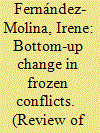

|
|
|
|
|
| Summary/Abstract |
This article proposes a typology of causal mechanisms whereby transnational relations of recognition constitute conflict actors in frozen conflicts. While the agency of an emerging conflict actor manifests itself in ‘struggles for recognition’ motivated by experiences of ‘disrespect’, responses from different significant others vary in terms of motivations and pathways (mechanisms of recognition). Adapting Honneth’s tripartite division, the typology distinguishes between four forms of recognition: thin cognitive recognition, ‘respect’/rights, ‘esteem’/difference, and ‘love’/empathy. Three transnational corrections are made in order to include transnational relations of recognition, non-state actors, and unstructured social-relational forms of international/transnational recognition. The typology is applied to the conflict of Western Sahara, which has been reshaped by the rise of internal Sahrawi pro-independence groups (based inside the territory annexed by Morocco) as an increasingly relevant conflict actor, with their identity shifting from victims to human rights activists to activists involved in an unsolved conflict. This identity and social-status formation has been the product of transnational recognition from three significant others: the annexing state (Morocco), the contested state-in-exile (SADR), and the international community. The overall effect of intermingling recognition processes, including various instrumental initiatives deprived of mutuality, has been increased struggle and conflict complexity rather than ‘recognitional peace’.
|
|
|
|
|
|
|
|
|
|
|
|
|
|
|
|
| 2 |
ID:
160874
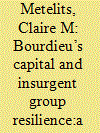

|
|
|
|
|
| Summary/Abstract |
The conflict between the rebel group, the Polisario Front, and the Kingdom of Morocco is nearing its 43rd year. Though under-reported, the conflict itself garners attention for the resilience – some would say tenacity – of the ethnically Sahrawi Polisario Front. Despite shifting regional and international politics and the nearly 150,000 Sahrawi refugees waiting in nearby Algerian camps, the rebel group has survived. What explains its resilience? This article uses Bourdieu’s ‘forms of capital’ to understand the Polisario Front’s persistence. Based on field research in Algeria, Western Sahara, and the United States, it finds that social, cultural, symbolic, and economic capital may provide an explanation.
|
|
|
|
|
|
|
|
|
|
|
|
|
|
|
|
| 3 |
ID:
012493
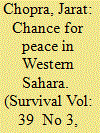

|
|
|
|
|
| Publication |
1997.
|
| Description |
51-65
|
|
|
|
|
|
|
|
|
|
|
|
|
|
|
|
| 4 |
ID:
184778
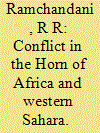

|
|
|
| 5 |
ID:
171820
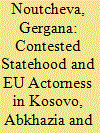

|
|
|
|
|
| Summary/Abstract |
What accounts for the variation in EU actorness in cases of contested statehood in the European Neighbourhood? A comparative analysis of the EU’s policies vis-à-vis three territorial conflicts – Kosovo, Abkhazia and Western Sahara – demonstrates the intricate relationship between external conditions and internal EU capability leading to substantial involvement, partial involvement or non-involvement in conflict management. Using insights from the EU actorness debate and the literatures on contested statehood and EU external governance, the paper offers a conceptualisation of the EU’s conflict management role and a contingent explanation of the EU’s varying commitment to managing conflicts in three cases of contested statehood. The paper finds that external determinants have a considerable weight in EU’s policies which existing research tends to overlook owing to its predominant focus on EU’s internal institutional procedures and instruments. It teases out the external action-enabling and action-hindering factors, in particular the external structural constraints arising from the nature of statehood contestation and the agency of other international and local players in the three conflicts in the European Neighbourhood.
|
|
|
|
|
|
|
|
|
|
|
|
|
|
|
|
| 6 |
ID:
063161
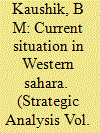

|
|
|
| 7 |
ID:
142669
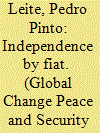

|
|
|
|
|
| Summary/Abstract |
Western Sahara and Timor-Leste (East Timor) are twin cases marking an incomplete end to the era of decolonization. The two are remarkably similar: they are former European colonies with peoples who had been promised self-determination only to be invaded within weeks of each other in late 1975 by neighboring states, themselves recently decolonized. Decades would pass while the international community stood by. The people of Timor-Leste eventually achieved freedom against the odds while most of Western Sahara and half the Saharawi people remain under foreign occupation, the scene of established human rights violations and the ongoing export of natural resources. For 25 years, Morocco has refused the Saharawi people a referendum, with the United Nations organization unable to respond as a result of a threatened veto by some permanent members of the Security Council. However, a Saharawi state arguably has come into being, enjoying popular legitimacy, governing institutions and accepted control over a part of Western Sahara. Moreover, regionally and within the African Union, the Saharawi Republic enjoys broad recognition and advocacy for its people. While drawing on lessons from the comparative experience of self-determination in Timor-Leste, this paper contends that the UN should follow the example of the African Union and welcome the Saharawi Republic as a member state. To achieve that result, a wider recognition among states is needed. The UN General Assembly, by employing its 1950 Uniting for Peace resolution, can decide to ‘consider the matter immediately' and compel a breakthrough which the Security Council has so far not been able to deliver.
|
|
|
|
|
|
|
|
|
|
|
|
|
|
|
|
| 8 |
ID:
167516
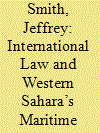

|
|
|
|
|
| Summary/Abstract |
Western Sahara’s coastal waters have become contentious because of seabed petroleum exploration and fisheries undertaken pursuant to treaties between Morocco and the European Union, Japan, and Russia. These activities have been protested by the territory’s government-in-exile, the Saharawi Arab Democratic Republic. In 2017 Morocco announced its intention to adopt legislation to create an exclusive economic zone (EEZ) on the territory’s coast. This article considers the status of Saharan coastal waters in the circumstances of decolonization and occupation. The obligations on states interested in exploring and extracting Saharan ocean resources are considered and are argued to be restrictive regardless of the status of the territory’s coastal waters and recognition of a Saharawi state.
|
|
|
|
|
|
|
|
|
|
|
|
|
|
|
|
| 9 |
ID:
093799
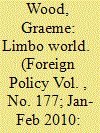

|
|
|
|
|
| Publication |
2010.
|
| Summary/Abstract |
On my recent visit to the Republic of Abkhazia, a country that does not exist, I interviewed the deputy foreign minister,Maxim Gundjia, about the foreign trade his country doesn't have with the real countries that surround it on the Black sea.
|
|
|
|
|
|
|
|
|
|
|
|
|
|
|
|
| 10 |
ID:
180315
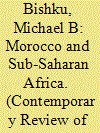

|
|
|
|
|
| Summary/Abstract |
During much of the past several decades, Moroccan actions in Western Sahara have impacted on that country’s bilateral and multilateral ties, especially with other countries in Africa, though to a lesser degree in the Arab world. In recent years, Morocco has gained the upper hand in its conflict in Western Sahara and has been increasing its political and economic footprint on the continent of Africa, an area of interest since independence. At the same time, Morocco has regarded itself as a “gateway” to Africa for the USA and Europe, while the USA, France (and the Gulf states) have provided military and financial assistance as well as diplomatic support for Morocco as that country’s policies have served Western interests. While attention is given by academics in recent years to the involvement in Africa of other middle powers from the Middle East such as Turkey, Iran and Saudi Arabia and, in the past, of Nasser’s Egypt and Qaddafi’s Libya, as well as Israel, Morocco has not stirred the same sort of interest. This article seeks to address that issue by examining all political and economic factors that have influenced Moroccan policy toward Sub-Saharan Africa, those both connected and unconnected with the issue of the Western Sahara dispute.
|
|
|
|
|
|
|
|
|
|
|
|
|
|
|
|
| 11 |
ID:
129933
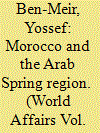

|
|
|
|
|
| Publication |
2014.
|
| Summary/Abstract |
Yossef Ben-Meir provides recommendations for promoting human development driven by local communities-vitally needed in the Arab Spring region-by analysing Morocco's experience and major ideas and lessons from the field of international development. He also connects decentralisation and human development to the cases of Egypt, Palestine and the Western Sahara and highlights their essential role in the context of globalisation and free trade.
|
|
|
|
|
|
|
|
|
|
|
|
|
|
|
|
| 12 |
ID:
096364
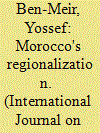

|
|
|
| 13 |
ID:
101094
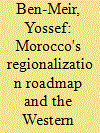

|
|
|
|
|
| Publication |
2010.
|
| Summary/Abstract |
King Mohammed VI of Morocco has announced a national regionalization plan that includes the Western Sahara. Morocco's intention is to regionalize (or, essentially, decentralize) decision-making authority and management in socioeconomic development, political affairs, the judicial system, and other important responsibilities and institutions. The author describes Morocco's roadmap to regionalization, analyzes its principal elements, and presents recommendations for its strategic implementation. Regionalization could potentially establish the necessary conditions to resolve the Western Saharan conflict, but only if it genuinely advances the political, social, economic, and environmental fulfillment of the people living there.
|
|
|
|
|
|
|
|
|
|
|
|
|
|
|
|
| 14 |
ID:
102497
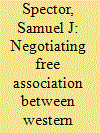

|
|
|
|
|
| Publication |
2011.
|
| Summary/Abstract |
The proposal of new negotiation formulae in the midst of stalemated conflicts can help to reframe the problem and restart dialogue. They can also unleash new controversy. The Moroccan Initiative for Negotiating an Autonomy Statute for the Sahara Region is a formulaic proposal advanced by Morocco to describe the broad outlines for Sahrawi autonomy under Moroccan sovereignty. It has been the subject of debate within the international community since it was first introduced in April 2007. Until now, however, discussion of its efficacy as a formulaic basis for a negotiated resolution to the Western Sahara dispute has largely outweighed serious consideration of how the proposal relates to current understandings of international law concerning self-determination and free association. Like Western Sahara, the Cook Islands, Niue, Aceh, New Caledonia, and Bougainville are cases of non-self-governing territories and other high autonomy arrangements where there has been recognition of the need to substitute, as the basis for ending the conflict, a comprehensive negotiated political status, in place of frequently unworkable or unattractive alternatives such as a contentious referendum on independence, open-ended talks, or continued armed conflict. In light of the lessons learned from actual state practice and international responses in the foregoing cases, an assessment of the present Moroccan proposal demonstrates that with some improvements, it may offer a viable new starting point for negotiations. The result of using this plan as a formula to restart negotiations can be the attainment for Western Sahara of a full measure of self-government - in a manner consistent with international law - by means of free association.
|
|
|
|
|
|
|
|
|
|
|
|
|
|
|
|
| 15 |
ID:
080933


|
|
|
|
|
| Publication |
2008.
|
| Summary/Abstract |
This paper discusses the right to self-determination of the indigenous people of Western Sahara. It studies their post-colonial struggle for self-determination, which has been denied owing to Morocco's occupation and forcible annexation of their territory in 1975. It also looks into the process by which the right of the Sahrawi people to self-determination has been institutionalized within the United Nations (UN) system as well as the ongoing UN peace efforts to implement this right and the prospects to which they may lead. Overall, the paper seeks to demonstrate that the continuation of the conflict in Western Sahara is a strong reminder of an enduring violation of a fundamental norm of international law, and the responsibility of the UN and the international community as a whole to redress this aberrant situation
|
|
|
|
|
|
|
|
|
|
|
|
|
|
|
|
| 16 |
ID:
142668
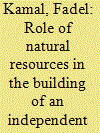

|
|
|
|
|
| Summary/Abstract |
The Saharawi Arab Democratic Republic (SADR) is a founding member of the African Union (AU) and is the sovereign governing authority in Western Sahara. The SADR government believes that the territory's significant natural resources will play an important part in the development of a viable, self-reliant and democratic nation which will contribute to peace, stability and progress of the Maghreb region. The paper examines the SADR's efforts to manage its natural resources through the establishment of the SADR Petroleum and Mines Authority, the launch of licensing rounds, its claim to an exclusive economic zone in the Atlantic Ocean and the recent enactment of a Mining Code. The paper discusses the SADR's efforts to protect its natural resources in a territory that is under occupation, and examines the SADR oil and gas licensing rounds as an example of SADR's assertion of sovereignty. The SADR natural resources strategy has two basic goals: to deter Morocco's efforts to exploit the country's natural resources and to prepare for the recovery of full sovereignty.
|
|
|
|
|
|
|
|
|
|
|
|
|
|
|
|
| 17 |
ID:
129610
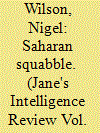

|
|
|
| 18 |
ID:
142670
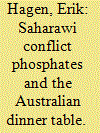

|
|
|
|
|
| Summary/Abstract |
This article describes how the investor community has intervened vis-à-vis the global fertilizer companies sourcing phosphate rock from occupied Western Sahara. The territory holds large phosphates deposits, and the export of such rock constitutes the biggest source of income for the Moroccan government in the territory it has annexed. Due to the particular nature of the conflict in that territory, such practice is associated with concerns of human rights breaches, international law violations and political controversy. A dozen companies purchase these phosphates from the Moroccan government, while their traditional and legal owners are increasingly active in trying to stop the practice. Investor engagement and company improvement are discussed with a particular focus on Australia. By the end of the 1980s, 39% of all phosphate rock in Western Sahara ended up in Australia. After a massive shareholder campaign directed at the Australian importers, the country has basically ended its dependence on such phosphate rock. The article also looks at import cases in North America. The article outlines the different arguments and strategies of investors, based on public statements and on internal dialogues between international investors and the civil society organization Western Sahara Resource Watch over the last decade.
|
|
|
|
|
|
|
|
|
|
|
|
|
|
|
|
| 19 |
ID:
142666
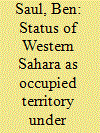

|
|
|
|
|
| Summary/Abstract |
Much of the international legal analysis of dealings in natural resources in Western Sahara has focused on its status as a Non-Self-Governing Territory, as well as the right of self-determination of the Sahrawi people. Surprisingly overlooked in the legal debates is a close examination of the application of the international law of occupation under international humanitarian law (IHL). This article considers whether and why Western Sahara is ‘occupied territory' under IHL, discussing some of the unique peculiarities that complicate the legal answer. It then considers issues of state responsibility and individual criminal liability under international law for unlawful dealings with natural resources in Western Sahara by Moroccan and foreign companies.
|
|
|
|
|
|
|
|
|
|
|
|
|
|
|
|
| 20 |
ID:
142564


|
|
|
|
|
| Summary/Abstract |
How does diplomacy recognise the political identity of international actors? Drawing on critical approaches, this article analyses the development of identities in diplomatic communications concerning the Western Sahara conflict from the early 2000s to the present. It argues that a failure to question relationships between identities as projected in diplomatic sources and those of global threats like Islamic terrorism is a crucial driver behind the stalemate. The analysis demonstrates that Frente Popular de Liberación de Saguía el Hamra y Río de Oro (POLISARIO) and Morocco became subsumed into the binary identities of the War on Terror due to the dominance of concerns about terrorism pervading diplomatic communication. Morocco played a significant role in this identification through textual interventions that linked POLISARIO identity to concerns about terrorism, gaining significant agency in the articulation of US and French policy on the conflict. This case illustrates how representations of identity in diplomatic communication in relation to dominant policy concerns grant actors agency for policy outcomes.
|
|
|
|
|
|
|
|
|
|
|
|
|
|
|
|
|
|
|
|
|